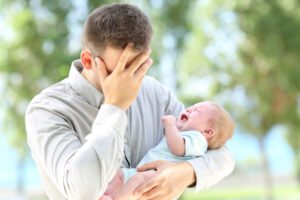
People suspected of causing a child to sustain Shaken Baby Syndrome (SBS) in Nevada face charges of either
These are felonies carrying several years in Nevada State Prison, though it may be possible to plea bargain the charges down considerably.
There are various defenses to Shaken Baby Syndrome-related charges, including that the incident was an accident. The prosecution usually relies on medical expert testimony when negotiating or litigating SBS cases.
The waiting period to get an SBS-related conviction sealed from criminal records is ten (10) years after the case closes. Meanwhile, aliens convicted of child abuse, attempted murder, or murder face deportation from the U.S.
In this article, our Las Vegas criminal defense attorneys discuss:
- 1. What is “Shaken Baby Syndrome”?
- 2. Is “Shaken Baby Syndrome” a crime in Nevada?
- 3. Can I go to prison?
- 4. How do I fight the charges?
- 5. Can I get my case sealed?
- 6. Can I get deported?
1. What is “Shaken Baby Syndrome”?
Also called “Abusive Head Trauma,” Shaken Baby Syndrome (“SBS”) is a form of child abuse where a person violently shakes an infant.
In many SBS cases, the shakers are frustrated parents, relatives, guardians, or babysitters who are attempting to quiet the child. However, SBS may result in devastating physical and mental harm. In the most extreme cases, SBS leads to infant death.
Babies with SBS typically display specific types of
- neck injuries,
- brain damage, and
- retinal hemorrhages.1

Expert medical witnesses may be necessary to determine whether a baby died from SBS.
2. Is “Shaken Baby Syndrome” a crime in Nevada?
Depending on the severity of the case, people suspected of giving a child SBS in Nevada may face charges of child abuse, attempted murder, second-degree murder, or first-degree murder:
Child Abuse
The legal definition of child abuse in Nevada is
“willfully caus[ing] a child who is less than 18 years of age to suffer unjustifiable physical pain or mental suffering[.]”
It does not matter if the person intended to harm the child. All that matters is that the person intended to act in a way that caused the injury.2
Therefore, a person who intentionally shakes a baby in a forceful way may face child abuse charges even if they did not intend for the child to be harmed. The mere act of violent shaking is sufficient to invite criminal prosecution in Nevada.
Attempted murder
Like it sounds, attempted murder in Nevada is
“the performance of an act which tends, but fails, to kill a human being, when such acts are done with…the deliberate intention unlawfully to kill.”3
Therefore, a person who shakes a baby with the intent to kill it would face attempted murder charges if the baby survives. If the person had no intent to kill the child, they did not commit attempted murder.
Second-degree Murder
Second-degree murder is unintentionally causing someone’s death through extremely reckless conduct. Even though the person did not mean to kill, a reasonable person should have known that this reckless conduct would probably result in a fatality.4
Therefore, a person who violently shakes a baby to death but who had no intention to kill the baby could be convicted of second-degree murder. A reasonable person should have foreseen that the violent shaking could kill the baby; though because the person had no intention to kill, they would be guilty of second- and not first-degree murder.
First-degree Murder
First-degree murder in Nevada is defined as either
- premeditated killing or
- a killing that happens in furtherance of a felony (called felony murder):
Premeditated killing
An example of premeditated killing in an SBS case is shaking a baby to death with the intent to kill the baby. In these cases, death was not unintentional or accidental. The person wanted the baby dead and acted to make it so.
Felony murder
An example of felony murder in an SBS case is intentionally shaking a baby in an unsafe manner (which is felony child abuse), and the baby dies as a result of the abuse. Even if the person did not intend for the baby to die, they would still face first-degree murder charges because they caused the death while committing felony child abuse.
Note that second-degree murder SBS cases and felony murder SBS cases have very similar fact patterns because they both involve unintentional killings. It is up to the D.A. to decide which crime to prosecute a suspect with.5
3. Can I go to prison?
Yes. The penalties for having caused SBS depend on which crime the defendant gets convicted of:
Child Abuse
Willfully abusing a child which results in substantial bodily harm is a category B felony, carrying
- two to twenty (2 – 20) years in prison.6
Attempted murder
Attempted murder is also a category B felony, carrying
- two to twenty (2 – 20) years in prison.7
Second-degree murder
Second-degree murder is a category A felony in Nevada, carrying:
- Life in prison with the possibility of parole after ten (10) years, or
- Twenty-five (25) years in prison with the possibility of parole after ten (10) years8
First-degree Murder
First-degree murder is a category A felony, carrying either:
- Death penalty;
- Life in prison without the possibility of parole;
- Life in prison with the possibility of parole after twenty (20) years; or
- Fifty (50) years in prison with the possibility of parole after twenty (20) years9
Note that the court may not impose the death penalty on defendants who are mentally retarded or who were under age eighteen (18) at the time of the murder.10
Also note that the court may impose capital punishment only if “aggravating circumstances,” if any, outweigh any “mitigating circumstances.” SBS murder cases always have at least one aggravating circumstance.
An example of an aggravated circumstance is that the victim was under age fourteen (14). An example of a possible mitigating circumstance is that the defendant was extremely emotionally disturbed at the time of the crime.11
4. How do I fight the charges?
The best defense strategies in SBS cases turn on the specific charges and facts of the case. Though one common defense is that the defendant was not to blame for the injuries. For example:
- The baby fell out of the crib, or
- The defendant dropped the baby by accident.
Either way, these are innocent accidents, and the defendant did nothing illegal.
SBS-related injuries are often different from other types of head and neck injuries. Therefore, the defense attorney would rely on expert medical witnesses to suggest that the baby was the victim of an unfortunate accident.
If the D.A. cannot prove beyond a reasonable doubt that the defendant was at fault, the charges should be dismissed.

Many infant deaths are the result of innocent accidents, not intentional acts of violence.
5. Can I get my case sealed?
Yes, barring extenuating circumstances. A Nevada conviction for child abuse, attempted murder, or murder can usually be sealed:
- ten (10) years after the case closes.12
Note that if the defendant wins the case and the charges get dismissed, the defendant can begin the record seal process right away.13
6. Can I get deported?
Yes. The offenses of child abuse, attempted murder, and murder are all crimes involving moral turpitude. Consequently, non-U.S. citizens convicted of any of these offenses may be deported from the U.S.14
Aliens who have been charged with causing SBS are advised to seek experienced legal counsel right away. The attorney may be able to negotiate with the D.A. to get the charges dropped or changed to non-removable offenses.
Call a Nevada criminal defense attorney…
If you have been arrested for causing Shaken Baby Syndrome or for other Nevada offenses, our Las Vegas criminal defense attorneys are here to help…
Call for a consultation to discuss how we may be able to get the charges reduced or dismissed. And if necessary, we can take the matter all the way to trial in pursuit of an acquittal.
Legal References:
- National Center on Shaken Baby Syndrome.
- NRS 200.481.
- NRS 200.030.
- Id.
- Id.
- NRS 200.481.
- NRS 200.030.
- Id.
- Id.
- NRS 176.025.
- NRS 200.033; NRS 200.035.
- NRS 179.245.
- NRS 179.255.
- 8 USC § 1227.

